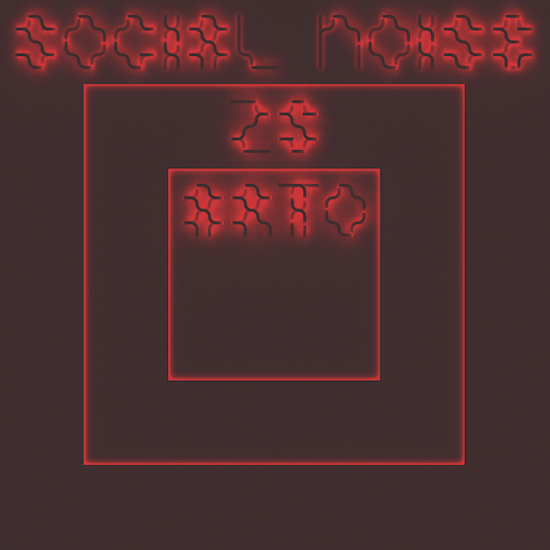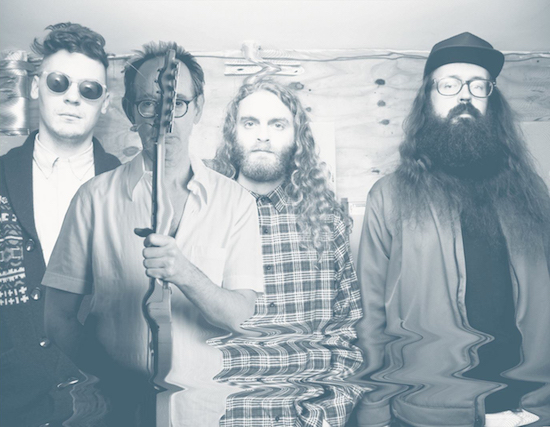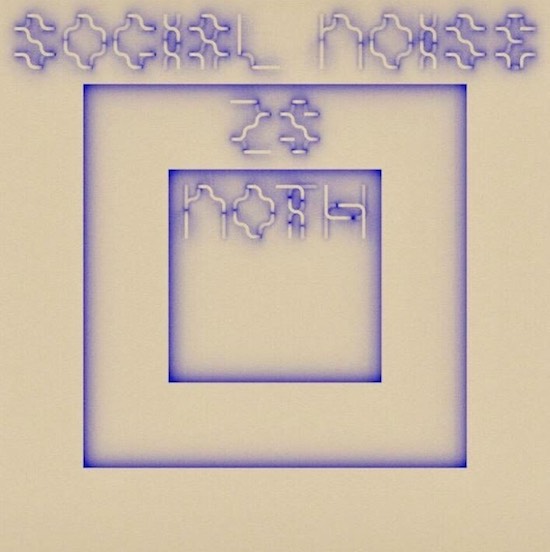The New York experimental band Zs are collaborating with the renowned guitarist and composer Arto Lindsay on a new album called Zs Arto, and you can listen to lead track ‘E’ above.
The trio, comprised of Sam Hillmer on tenor sax, Patrick Higgins on guitar and Guardian Alien’s Greg Fox on drums, recently started their own label Social Noise in conjunction with the NYC Commend record shop and RVNG INTL in order to release their last album Noth in February and the Arto Lindsay collaboration which will be released later this Spring.
The label Social Noise has been created as a way of giving Zs more control over their output – at every level of the process, including not having any of their music streaming on services such as Spotify, with an emphasis placed on the physical object (although albums can be bought as downloads as well as on vinyl).
Ahead of the Arto Lindsay and Zs concert at Rewire 2018 this weekend, Patrick Higgins and Sam Hillmer talked to us about the incompatibility of the socialist model with a capitalist mechanism when it comes to streaming, why they prefer an honest gangster to a corrupt businessman and why their stance is not luddite.
Given that it’s a sure fire way of taking all of your money and flinging it into the flaming vent of an active volcano, can you explain what form of madness was seizing your hearts when you decided to start a record label in 2017?
Patrick Higgins: I think the initial impetus was to develop a series, an on-going project of releasing our most current work in a more direct way, less mediated and less inhibited by the constraints of the traditional "album cycle". Our intention is also to focus on the records as specific physical objects, as documents of a particular creative engagement, that we want to share in a direct-to-fan style. Both archival and design oriented. The Social Noise series in this respect is also about artists taking more control over their own media, from design, to release dates, to distribution, and all aspects of involvement in the production process.
Each release will feature basically the same artwork, with changing colour schemes and text, but essentially reinforcing a focus on continuous, serial production, and a focus on the music contained on each disc. We are really interested in presenting our work this way most especially given how severe and alienating so much of the digital music world has become from the artist standpoint. We don’t want to alienate our listeners at all, it’s more about encouraging the kind of participation that we all used to feel in seeking out records and music we wanted to engage with as fans, searching from store to store to find a rare or super underground label release, maybe only ever finding it at a concert, these experiences lent a strong sense of cohesion and uniqueness and adventure to the alternative music scene. Knowing that we can’t and don’t want to just "step back in time", there is however really a feeling that can imbue a record more as a special object if it’s available directly from a band, at their show, or at a few unique places that have to be sought out.
Sam Hillmer: The game of doing music has become so friggin’ byzantine. You make this stuff [music], which goes to a label, the label then employs a publicist and makes different distribution deals with various physical and digital outlets or distribution houses. Then somehow, by dint of all these relationships (with people and entities that you the artist never meet or really have any real knowledge of), your music gets ‘out there’ and gets heard, apparently, by people.
A writer at some platform posts a track, and you watch the clicks climb, but this chain now has at least five or six links in it, and what’s at the the other end, but the most disembodied evidence of their being a person somewhere who, we believe, is listening to the music. This is not even to mention all of the streaming services who magically have everything we’ve ever created, and in exchange for our life’s work we get… exactly nothing.
So the whole thing has become this alienated and alienating, bizarre process that really leaves you, the artist, wondering about every aspect of it. I suppose we just got tired of it. The internet is like a fake friend, that will tell you anything to get something from you that it wants, but getting what you want from it, increasingly becomes a retreating horizon. I think I speak for all of us when I say there was a hankering for a simpler time. You make a cassette, and you tour the country and put it in people’s hands. Maybe not 50K people, or however many clicks your soundcloud says it has, but real living, breathing, people with red blood. In retrospect, this was actually a better way of doing things. So we wanted to return to that, and we wanted to do so on our terms, and do everything exactly how we saw fit, so we partnered with our friends at RVNG INTL. through their store Commend NYC, toward the end of realising this label, Social Noise, and so far it’s been sick.

Can you describe to me how you first met Arto Lindsay and what that meeting was like?
SH: I first met Arto Lindsay at the New York apartment of fine art curator/ dealer/ manager, Diego Cortez, one of the greats! Arto is an amazing person, he has this incredible light energy, and is a hilarious character and fun to hang out with. I can’t remember who met who in what order, but Greg, Pat and I all ended up having dealings with Arto separately. Greg has played with Arto in a couple of groups, Pat produced and played guitar on his recent record Cuidado Madame, I play with Arto as part of a duo we call Town, so things were already brewing when we linked up to record quartet. We spent a weekend in Hudson tracking at Pat’s studio Future Past, and we liked what we got from that, so here we are.
To what extent do Zs and DNA exist on a New York musical/artistic continuum – if such a thing even exists in the 21st Century.
SH: Oh, I’d say that’s fairly present. Confrontational aesthetics, seeking to create visceral experiences for audiences, and really own a room. It’s not rocket science, but the two groups definitely share things aesthetically and mission wise, I believe.
NOTH – Social Noise by Zs on VEVO.
What was your process for making the Arto album and how did that differ to your usual process (or how you made Noth, for example)?
SH: We talked about the playing, but it was basically free form playing. It honestly does not differ a lot from what ZS has been doing for the past few years, which has been to really explore our rapport as improvisors, working toward composition again very gradually and with a refreshed vocabulary. A lot of what has been great and inspiring about the last few years has been the amount of collaboration we’ve been able to do, so working with Arto figured right into that.
PH: His personality musically is really easy for us to relate to and to incorporate into our own musical machines. Arto’s approach is so timbral, so rhythmic, intense and harsh, but really sensitive to what is happening in musical time and dynamic level, it makes it really easy and exciting to play with him. We all also share a strongly "weird" sense of style.
While personally I applaud Social Noise’s decision to have no part in streaming – what would you say to accusations of luddism or closing the stable door after the nag has bolted? And what do you hope to achieve?
SH: I understand the appearance of luddism, but it is not the case. We don’t have problems with the most modern of tools, as long as they are used by us in our service. The internet and it’s logic has turned the world’s musical communities of practice into this massive tin pan alley that serves Ray Ban, Red Bull, Mountain Dew, I Can’t Believe It’s Not Butter, whatever… You slave over a track and are meant to feel lucky when it gets posted to, let’s say, FADER, or something. But by 3PM the same day it’s off the ‘front’ page and is never seen again, while a new track sits atop the page next to the same Heineken add your track was situated next too. It’s clear who is working for who here. So the internet is not functioning as a tool for most musicians, in fact it’s the other way around. Anyhow, point is, it is not a problem with technology, the issue is not wanting to be bound up in a system that does not have our interests in mind, or really serve us at all.
The counter argument there would be that the internet allows us to ‘reach’ more people. But I disagree. The techno-social space of the internet becomes more and more saturated by the second, and as such, people become increasingly bored by it. It simply is not a compelling way to learn about or consume music. Going to great lengths to obtain a recording or see a performance, traveling, getting to a venue without a ticket but then somehow getting in, buying records directly from a band that cannot be obtained elsewhere, and then traveling home wondering what is on the record. These are the materials of memories. Thumbing through posts on your phone, erases memories. The internet is how people will forget you. It cannot be totally excised from one’s life at this point, but we can chose to become less reliant on it, and be creative about new (or old) systems of social practice that achieve the same ends, but with greater social connectivity along the way.
What was sold to us as a means of generating community and becoming free from mass media, has become an instrument of alienation and surveillance BY the mass media. I’m not mad about it, but it is what it is.
What we hope, is that treating our work this way, being deliberate and discerning about how we share it and with whom, will lead to more substantive connections with real people. People that we hope to see in person at our shows again and again. OG building a fan base one person at a time by just straight up meeting people. When we announced the first release on social noise before our last tour, our interactions with our fans – online and in person – SPIKED! And it felt great! We’re hoping for more of that.
Lastly, the bit about the horse… I’m not trying to come across as sour grapes or as an ‘I told you so’ sort. I didn’t tell anyone so. We did the internet thing for years, hook line and sinker. But it’s gotten whack, so for now, peace.

The track you’ve kindly given to us to stream is on Soundcloud; is that OK?
SH: Yes. Again, It’s not that we are saying that the internet is inherently all bad. Or that a given platform is inherently all bad (except for Spotify, those cats are friggin’ gangsters). Giving tQ a track on soundcloud on the occasion of us playing Rewire, is fine, because we are really working with that festival, and Rewire is really working with [tQ]. We like this website and we’re happy to work on something together and you are clearing some space for some real dialogue. So that is fine. What we are rejecting is the presumption that everything is going to stream everywhere for free, and that all press is good press, and that getting clicks is synonymous with having fans, or that having ‘friends’ or ‘likes’ is the same as having community. Those things are lies, working together with some like minded people on sparking dialogue and sharing music is real. I hope I’m being clear here, are we good?
Yes we’re good! What do you think of YouTube?
SH: I like it. And actually, I don’t care about people stealing the music and posting it to YouTube or reddit or 4chan or what have you. Theft is a more noble act then what Spotify does. The kid who rips the record and puts it on one of those platforms to share with they’re friends, they’re like the person I buy weed from. Spotify is like the Sackler family, they invented Oxycotin, they make it seem civilised, but they are mass murderers. [Woah there Nelly! tQ Legal Ed] Now, spotify is not killing anyone, but it’s the same logic. Finding a way to dress up the same grimey act of theft as something professional and dignified. If you’re a gangster, then be a gangster, but if you want to put on a suit and make it seem ok, that gets no respect.
Do you believe that music disseminated by DL or physical copy with be better inculcated into the listener rather than if it was streamed?
SH: Yes. Something that we have to take into account as people hoping to disseminate culture, is that the internet is increasingly dominated by a logic of immediate gratification. It is a known fact that people’s notifications are tied to dopamine hits, or that being away from one’s phone makes people anxious. The logic of the internet, the platforms, smart phones, etc., is burning out people’s receptors for this shit. People see a soundcloud embed, and jump to the part of the wave form where the track has clearly ‘dropped’ give it a few seconds, and keep it moving. Why jockey to be a part of that? People aren’t stupid. There is a GROWING skepticism about the internet. People want experiences, they believe in what is really happening to them. So yes, I think a full holistic experience of getting out, going to a show, or going to get and touch a record and take it home, yes that reaches people more effectively than posting it somewhere.
PH: Streaming has wonderful aspects, the wide availability of music across the globe could be a force of peace, of revolution, of awakening. BUT it can’t be because we live in a techno-capitalist regime in which all of these networks of dissemination are privately owned, with the wealth of income from their use accruing to a very, very, very small number of stockholders, board members and executives. The model of widespread free music internet streaming is socialist, but the mechanism is capitalist, and the schism between those two is where financial violence is done to artists and consumers alike.
I think there is also a very strong and very fascinating effect on the quality and style of listening itself. Putting on a full record by an artist involves not only the ritual of turning on a stereo, taking the record out, etc, but also involves the specific relationship to time that emerges from engaging with a work of music as a "work", not just as a flicker of light in a stream. The metaphor itself, the "stream", seems to de-prioritise the substance of a musical work to the larger flow of information per se. A record is concrete, an object, but also fluid in a more productive way; it is fluid in its capacity for the imagination, there is no imagination in a constant stream of shuffled algorithmic playlisted music data.
What can attendees of the Rewire 2018 expect of your live set this weekend?
SH: A wild ride. Shit is going to be hair raising!
Zs and Arto Lindsay appear live at Rewire 2018 on Saturday 7 April in the Hague, NL. Zs Arto is available to buy on LP & DL from Commend


